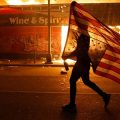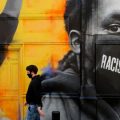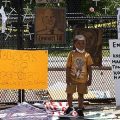Struggling to make sense of the senseless
“Those who profess to favor freedom and yet depreciate agitation, are people who want crops without ploughing the ground…. The struggle may be a moral one, or it may be a physical one, or it may be both. But it must be a struggle.”
—Frederick Douglass
Like many Americans, watching multiple incidents of deadly violence against black people unfold before our eyes has left us feeling demoralized and distraught, aghast, and angry. Not only have we been forced to grapple with the impact of a global pandemic, we have been forced to confront the reality that, despite gains made in the past fifty years, we are still a nation riven by inequality and racial division. The state of our democracy feels fragile and precarious.
Once again, we struggle to make sense of the senseless. Once again, we bear witness to our country’s troubled history of racial violence, from Freddie Gray and Eric Garner to Sandra Bland and Trayvon Martin. Once again, we try to cope as best as we can, whether suffering in silence, participating in protests, or engaging in conversations that evoke all of our emotions. Once again, we try to explain to our children that which cannot be explained. Once again, we pray for justice and we pray for peace. Once again.
We express our deepest sympathy to the families and communities of George Floyd, Ahmaud Arbery, Breonna Taylor, Tony McDade, and the far too many preceding them whose needless deaths were brought about by unjustified violence. We hope that their pain and sorrow compel America to confront its tortured racial past, and that this moment becomes the impetus for our nation to address racism and social inequities in earnest.
Although it will be a monumental task, the past is replete with examples of ordinary people working together to overcome seemingly insurmountable challenges. History is a guide to a better future and demonstrates that we can become a better society—but only if we collectively demand it from each other and from the institutions responsible for administering justice.
Frederick Douglass famously said, “Those who profess to favor freedom and yet depreciate agitation, are people who want crops without ploughing the ground…. The struggle may be a moral one, or it may be a physical one, or it may be both. But it must be a struggle.” At this pivotal moment when the eyes of the nation and the world are upon Minneapolis, will we join the struggle to seek justice and equality? Will we heed the call of courageous figures throughout history who spoke out against slavery, marched on for voting rights, and sat in for basic equality? Will we challenge the nation to live up to its founding ideals? In the memory of those taken from us and for the good of the country, I hope that we do.
Even though we are physically apart, I want you to know that there are still ways to connect and resources readily available to you. If you are struggling and need help or are just looking for a way to connect, I encourage you to seek help through our Employee Assistance Program. Here you will find counseling services that can help you with stress and personal and emotional well-being. You may also contact the Smithsonian Ombuds, a neutral resource available to assist staff in resolving work-related problems and concerns confidentially through informal means.
In the coming days, we will work on a number of ideas to help us facilitate meaningful conversations, raise awareness, and discuss actions we can take as a community for positive change. I invite your feedback about constructive and creative ways to most effectively address this moment. Let us take this opportunity to help the country heal and come together for better understanding.
Posted: 31 May 2020
- Categories:








